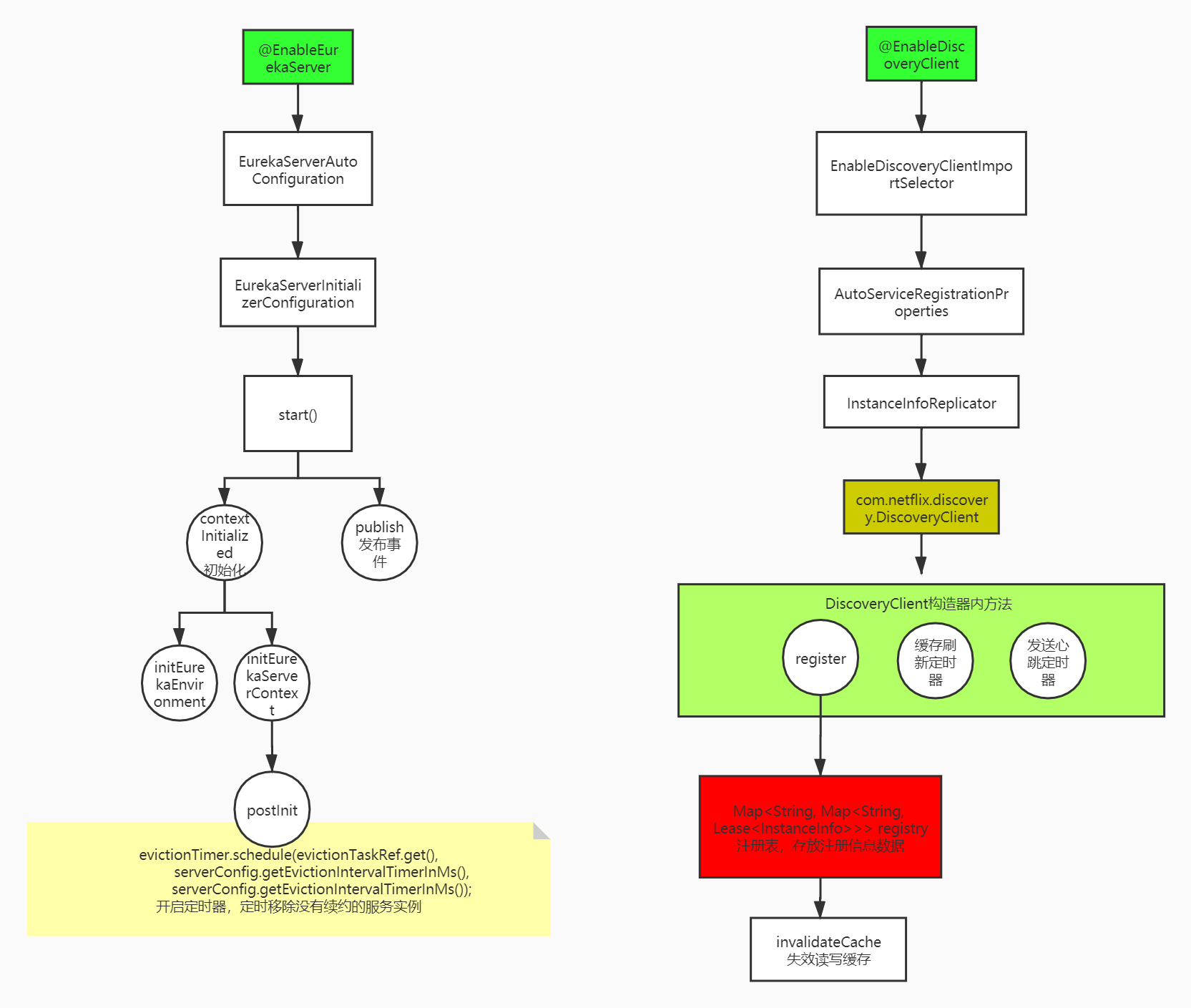Eureka源码分析
女友在高考 人气:0源码流程图
先上图,不太清晰,抱歉

一、Eureka Server源码分析
- 从@EnableEurekaServer注解为入口,它是一个标记注解,点进去看
- 注解内容如下
/**
* 激活Eureka服务器相关配置的注释
* Annotation to activate Eureka Server related configuration {@link EurekaServerAutoConfiguration}
*
* @author Dave Syer
* @author Biju Kunjummen
*
*/
@Target(ElementType.TYPE)
@Retention(RetentionPolicy.RUNTIME)
@Documented
@Import(EurekaServerMarkerConfiguration.class)
public @interface EnableEurekaServer {
}
- 从注解可以看到它@link 了配置启动类EurekaServerAutoConfiguration,这个类会将配置信息读取进来
@Configuration
@Import(EurekaServerInitializerConfiguration.class)
@ConditionalOnBean(EurekaServerMarkerConfiguration.Marker.class)
@EnableConfigurationProperties({ EurekaDashboardProperties.class,
InstanceRegistryProperties.class })
@PropertySource("classpath:/eureka/server.properties")
public class EurekaServerAutoConfiguration extends WebMvcConfigurerAdapter {
}
-
EurekaServerAutoConfiguration上有一个注解@Import(EurekaServerInitializerConfiguration.class),@Import的作用会将这个类的实例加入IOC容器。
-
所以EurekaServerInitializerConfiguration这个类会被初始化,它实现了SmartLifecycle接口,当ApplicationContext自身启动时会调用他的start()方法。
@Configuration
public class EurekaServerInitializerConfiguration
implements ServletContextAware, SmartLifecycle, Ordered {
//省略部分代码
@Override
public void start() {
new Thread(new Runnable() {
@Override
public void run() {
try {
//TODO: is this class even needed now?
//初始化EurekaServer,同时启动Eureka Server
eurekaServerBootstrap.contextInitialized(EurekaServerInitializerConfiguration.this.servletContext);
log.info("Started Eureka Server");
//事件发布
publish(new EurekaRegistryAvailableEvent(getEurekaServerConfig()));
EurekaServerInitializerConfiguration.this.running = true;
publish(new EurekaServerStartedEvent(getEurekaServerConfig()));
}
catch (Exception ex) {
// Help!
log.error("Could not initialize Eureka servlet context", ex);
}
}
}).start();
}
}
- 从eurekaServerBootstrap.contextInitialized()方法进去
public void contextInitialized(ServletContext context) {
try {
//初始化环境变量
initEurekaEnvironment();
//初始化上下文
initEurekaServerContext();
context.setAttribute(EurekaServerContext.class.getName(), this.serverContext);
}
catch (Throwable e) {
log.error("Cannot bootstrap eureka server :", e);
throw new RuntimeException("Cannot bootstrap eureka server :", e);
}
}
- initEurekaEnvironment里面都是一些环境变量初始化,不用太关心。主要看initEurekaServerContext()这个初始化上下文的方法
protected void initEurekaServerContext() throws Exception {
// For backward compatibility
JsonXStream.getInstance().registerConverter(new V1AwareInstanceInfoConverter(),
XStream.PRIORITY_VERY_HIGH);
XmlXStream.getInstance().registerConverter(new V1AwareInstanceInfoConverter(),
XStream.PRIORITY_VERY_HIGH);
if (isAws(this.applicationInfoManager.getInfo())) {
this.awsBinder = new AwsBinderDelegate(this.eurekaServerConfig,
this.eurekaClientConfig, this.registry, this.applicationInfoManager);
this.awsBinder.start();
}
EurekaServerContextHolder.initialize(this.serverContext);
log.info("Initialized server context");
// Copy registry from neighboring eureka node
int registryCount = this.registry.syncUp();
//这句重要,里面会打开定时器
this.registry.openForTraffic(this.applicationInfoManager, registryCount);
// Register all monitoring statistics.
//注册所有监视统计信息
EurekaMonitors.registerAllStats();
}
- 进入openForTraffic方法内部
@Override
public void openForTraffic(ApplicationInfoManager applicationInfoManager, int count) {
// Renewals happen every 30 seconds and for a minute it should be a factor of 2.
this.expectedNumberOfRenewsPerMin = count * 2;
this.numberOfRenewsPerMinThreshold =
(int) (this.expectedNumberOfRenewsPerMin * serverConfig.getRenewalPercentThreshold());
logger.info("Got {} instances from neighboring DS node", count);
logger.info("Renew threshold is: {}", numberOfRenewsPerMinThreshold);
this.startupTime = System.currentTimeMillis();
if (count > 0) {
this.peerInstancesTransferEmptyOnStartup = false;
}
DataCenterInfo.Name selfName = applicationInfoManager.getInfo().getDataCenterInfo().getName();
boolean isAws = Name.Amazon == selfName;
if (isAws && serverConfig.shouldPrimeAwsReplicaConnections()) {
logger.info("Priming AWS connections for all replicas..");
primeAwsReplicas(applicationInfoManager);
}
logger.info("Changing status to UP");
applicationInfoManager.setInstanceStatus(InstanceStatus.UP);
//启动定时器
super.postInit();
}
- 进入super.postInit();方法,开启了定时器,清理没有按时续约的client
protected void postInit() {
renewsLastMin.start();
if (evictionTaskRef.get() != null) {
evictionTaskRef.get().cancel();
}
evictionTaskRef.set(new EvictionTask());
evictionTimer.schedule(evictionTaskRef.get(),
serverConfig.getEvictionIntervalTimerInMs(),
serverConfig.getEvictionIntervalTimerInMs());
}
- 剔除服务的方法可以看看,主要思想就是找到要剔除服务的服务id,然后从map移除
public void evict(long additionalLeaseMs) {
logger.debug("Running the evict task");
if (!isLeaseExpirationEnabled()) {
logger.debug("DS: lease expiration is currently disabled.");
return;
}
// We collect first all expired items, to evict them in random order. For large eviction sets,
// if we do not that, we might wipe out whole apps before self preservation kicks in. By randomizing it,
// the impact should be evenly distributed across all applications.
List<Lease<InstanceInfo>> expiredLeases = new ArrayList<>();
for (Entry<String, Map<String, Lease<InstanceInfo>>> groupEntry : registry.entrySet()) {
Map<String, Lease<InstanceInfo>> leaseMap = groupEntry.getValue();
if (leaseMap != null) {
for (Entry<String, Lease<InstanceInfo>> leaseEntry : leaseMap.entrySet()) {
Lease<InstanceInfo> lease = leaseEntry.getValue();
if (lease.isExpired(additionalLeaseMs) && lease.getHolder() != null) {
expiredLeases.add(lease);
}
}
}
}
// To compensate for GC pauses or drifting local time, we need to use current registry size as a base for
// triggering self-preservation. Without that we would wipe out full registry.
int registrySize = (int) getLocalRegistrySize();
int registrySizeThreshold = (int) (registrySize * serverConfig.getRenewalPercentThreshold());
int evictionLimit = registrySize - registrySizeThreshold;
int toEvict = Math.min(expiredLeases.size(), evictionLimit);
if (toEvict > 0) {
logger.info("Evicting {} items (expired={}, evictionLimit={})", toEvict, expiredLeases.size(), evictionLimit);
Random random = new Random(System.currentTimeMillis());
for (int i = 0; i < toEvict; i++) {
// Pick a random item (Knuth shuffle algorithm)
int next = i + random.nextInt(expiredLeases.size() - i);
Collections.swap(expiredLeases, i, next);
Lease<InstanceInfo> lease = expiredLeases.get(i);
String appName = lease.getHolder().getAppName();
String id = lease.getHolder().getId();
EXPIRED.increment();
logger.warn("DS: Registry: expired lease for {}/{}", appName, id);
//根据id移除
internalCancel(appName, id, false);
}
}
}
二、Eureka客户端源码
通过看源码想要解决的问题 :
问题: 如何实现自动注册的?
- 通过这个类EurekaClientAutoConfiguration入手
- 该类里有个eurekaClient方法
@Bean(destroyMethod = "shutdown")
@ConditionalOnMissingBean(value = EurekaClient.class, search = SearchStrategy.CURRENT)
@org.springframework.cloud.context.config.annotation.RefreshScope
@Lazy
public EurekaClient eurekaClient(ApplicationInfoManager manager, EurekaClientConfig config, EurekaInstanceConfig instance) {
manager.getInfo(); // force initialization
return new CloudEurekaClient(manager, config, this.optionalArgs,
this.context);
}
- 可以看出他new 了一个CloudEurekaClient对象,而他的父类是DiscoveryClient,所以DiscoveryClient的构造方法会被执行。
- 构造方法里的重要方法部分
try {
// default size of 2 - 1 each for heartbeat and cacheRefresh
scheduler = Executors.newScheduledThreadPool(2,
new ThreadFactoryBuilder()
.setNameFormat("DiscoveryClient-%d")
.setDaemon(true)
.build());
heartbeatExecutor = new ThreadPoolExecutor(
1, clientConfig.getHeartbeatExecutorThreadPoolSize(), 0, TimeUnit.SECONDS,
new SynchronousQueue<Runnable>(),
new ThreadFactoryBuilder()
.setNameFormat("DiscoveryClient-HeartbeatExecutor-%d")
.setDaemon(true)
.build()
); // use direct handoff
cacheRefreshExecutor = new ThreadPoolExecutor(
1, clientConfig.getCacheRefreshExecutorThreadPoolSize(), 0, TimeUnit.SECONDS,
new SynchronousQueue<Runnable>(),
new ThreadFactoryBuilder()
.setNameFormat("DiscoveryClient-CacheRefreshExecutor-%d")
.setDaemon(true)
.build()
); // use direct handoff
eurekaTransport = new EurekaTransport();
scheduleServerEndpointTask(eurekaTransport, args);
AzToRegionMapper azToRegionMapper;
if (clientConfig.shouldUseDnsForFetchingServiceUrls()) {
azToRegionMapper = new DNSBasedAzToRegionMapper(clientConfig);
} else {
azToRegionMapper = new PropertyBasedAzToRegionMapper(clientConfig);
}
if (null != remoteRegionsToFetch.get()) {
azToRegionMapper.setRegionsToFetch(remoteRegionsToFetch.get().split(","));
}
instanceRegionChecker = new InstanceRegionChecker(azToRegionMapper, clientConfig.getRegion());
} catch (Throwable e) {
throw new RuntimeException("Failed to initialize DiscoveryClient!", e);
}
if (clientConfig.shouldFetchRegistry() && !fetchRegistry(false)) {
fetchRegistryFromBackup();
}
// call and execute the pre registration handler before all background tasks (inc registration) is started
if (this.preRegistrationHandler != null) {
this.preRegistrationHandler.beforeRegistration();
}
if (clientConfig.shouldRegisterWithEureka() && clientConfig.shouldEnforceRegistrationAtInit()) {
try {
if (!register() ) {
throw new IllegalStateException("Registration error at startup. Invalid server response.");
}
} catch (Throwable th) {
logger.error("Registration error at startup: {}", th.getMessage());
throw new IllegalStateException(th);
}
}
// finally, init the schedule tasks (e.g. cluster resolvers, heartbeat, instanceInfo replicator, fetch
//初始化定时器任务
initScheduledTasks();
try {
Monitors.registerObject(this);
} catch (Throwable e) {
logger.warn("Cannot register timers", e);
}
- 在initScheduledTasks方法里有一个状态改变监听器StatusChangeListener,他会触发instanceInfoReplicator.onDemandUpdate();方法,该方法会调用run方法
- 在InstanceInfoReplicator的run方法里调用了 discoveryClient.register()方法
- 就是该方法完成了服务注册,看下面代码可以看出通过http方式请求服务端完成了注册
boolean register() throws Throwable {
logger.info(PREFIX + "{}: registering service...", appPathIdentifier);
EurekaHttpResponse<Void> httpResponse;
try {
httpResponse = eurekaTransport.registrationClient.register(instanceInfo);
} catch (Exception e) {
logger.warn(PREFIX + "{} - registration failed {}", appPathIdentifier, e.getMessage(), e);
throw e;
}
if (logger.isInfoEnabled()) {
logger.info(PREFIX + "{} - registration status: {}", appPathIdentifier, httpResponse.getStatusCode());
}
return httpResponse.getStatusCode() == 204;
}
- 可以看到客户端有日志{registering service...}打印,说明确实执行到了这个方法。
- 并且会发现有两个定时任务一直在执行,一个HeartbeatThread,一个CacheRefreshThread
多级缓存思想
- 在拉取注册表的时候
- 首先从ReadOnlyCacheMap中查询缓存的注册表
- 如果没有,就找ReadWriteCacheMap里缓存的注册表
- 如果还没有,就从内存中获取实际的注册表数据
- 注册表发生变更的时候
- 会在内存中更新变更的注册表数据,同时过期掉ReadWriteCacheMap。
- 此过程中不会影响ReadOnlyCacheMap提供使用。
- 默认30秒ReadWriteCacheMap的数据更新到ReadOnlyCacheMap
- 默认180秒秒ReadWriteCacheMap的数据失效
- 下次有服务拉取注册表,又会从内存中获取最新数据了,同时填充各级缓存
加载全部内容